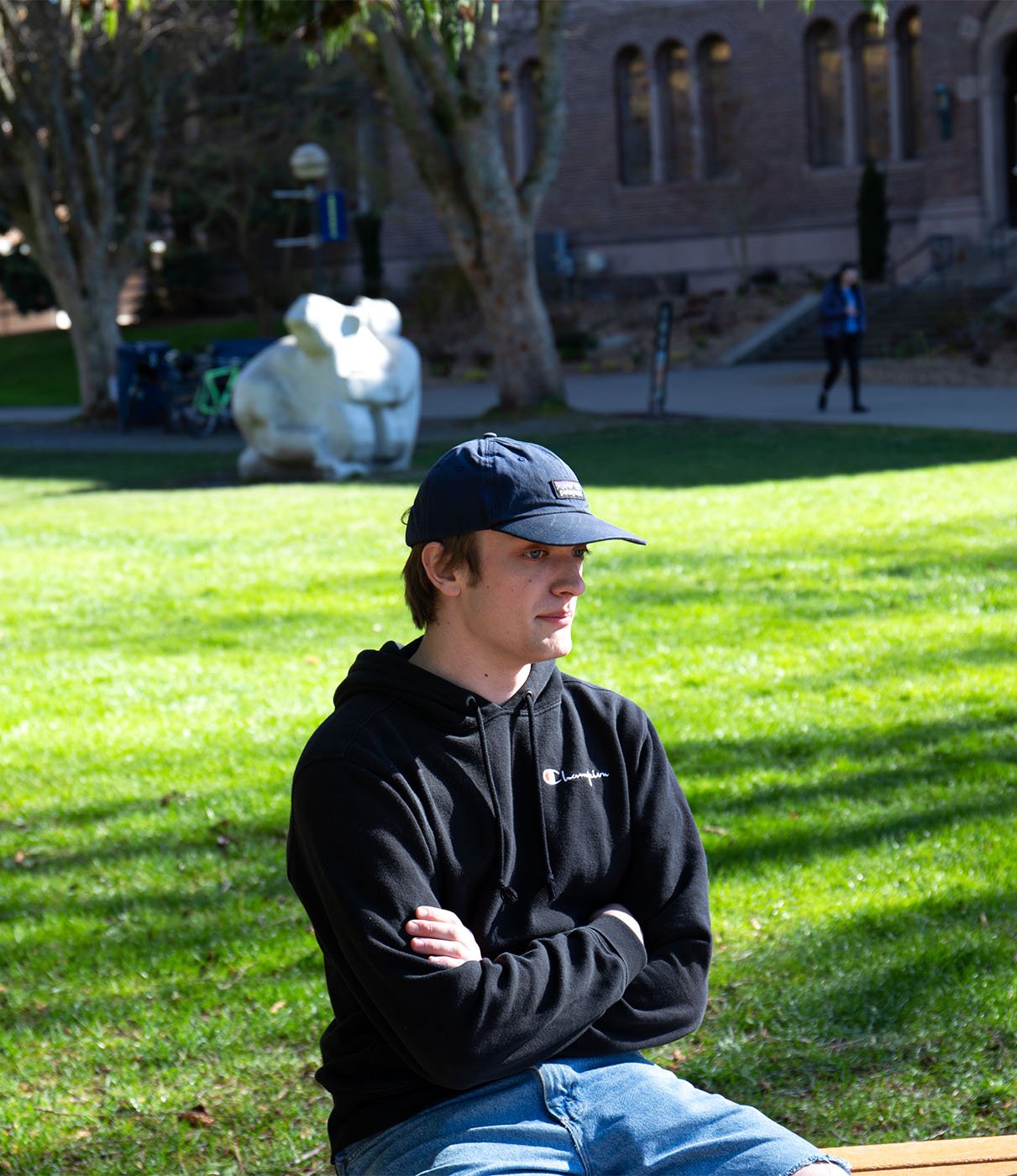Investing in a Green Future
Can Western Washington University invest in a sustainable future despite uncertainties?
The steam generator next to Miller Hall on Western’s campus. // Photo by Nikoli Habek
June 4, 2023
Story by Margaret Roberts
Recent climate science shows that the burning of fossil fuels is the most prominent factor contributing to climate change. The carbon emissions released from fossil fuel combustion, as well as other human factors, are warming the planet at unprecedented rates, according to the latest report from the International Panel on Climate Change.
For this reason, Western Washington University’s Students for Renewable Energy (SRE) campaigned to divest from fossil fuels, beginning in 2012. The group rallied students, faculty and community members to come together and fight for a common cause: to withdraw all investments relating to fossil fuels from Western's portfolio.
Although many people supported the campaign, in 2014 the Foundation Governing Board (FGB) ultimately decided “divestment would be ineffective and inconsistent with Foundation fiduciary values,” according to Western Today.
Jill MacIntyre Witt, faculty advisor for SRE since 2010, explains that it was and has always been a tough battle.
“Making change is hard when the world is viewed through an economic lens,” MacIntyre Witt said.
Liam Pratt sits in the yard area between Wilson library and Viking union at Western’s campus. // Photo by Nikoli Habek
Today, students’ main focus ensures that the needs of the current generation do not hinder the needs of future generations. In this case, the SRE and other clubs believe that Western can get a return on their investments without impeding the quality of life for future Western students.
Lack of transparency from Russell Investments, the firm that currently runs Western’s investment portfolio, is potentially halting progress in the campaign for sustainable investments.
“Students should know where their money’s going, and it should be easier to access that. There should be more transparency when it comes to our sustainability practices,” said Liam Pratt, co-founder of Students for Climate Action (SCA).
SCA is a Western club that is focusing on student outreach and spreading information about where Western’s investments stand.
A decade of divesting efforts
Jenny Godwin, president of the SRE in 2012, led her team in protests, organized meetings and spearheaded a petition which was signed by hundreds. After years of planning, a five-year divestment plan was proposed to the Foundation Governing Board.
“Thinking through, it probably felt like a very big ask to them. To us, it was just an extremely important ask, and there was no reason not to take that level when urgency was, and obviously still is, very high around halting climate change,” Godwin said. “It felt like a really reasonable thing to be doing, a state of emergency really, that we're in.”
The FGB determined that divestment would be a financial conflict in 2014. The potential loss of scholarships and other important funds that contribute to the needs of students and faculty members was a determining factor, according to an FAQ about divestment from Western.
“I remember feeling a bit frustrated at the time, feeling like we spent years building this campaign, and that in the end, it could just be a vote,” Godwin said.
Although the foundation did not comply with fully divesting from fossil fuels, the SRE had a large impact on the investments. SRE pushed the foundation to invest in companies using Environmental, Social and Governance (ESG) criteria. After SRE conducted research leading them to the most effective candidates, Western opened a new avenue with Russell Investments who use ESG as a more sustainable option in 2019.
Russell Investments was hired to invest in a portfolio with various stocks, real estate, bonds and private capital. The FGB uses the returns on these assets to primarily fund scholarships, as well as a variety of programs and professorships. The endowment fund used for these actions sat at $109.8 million in 2022.
Many are considering a new path in this movement. Instead of pushing Western to fully divest from fossil fuels, fully investing in companies with ESG criteria could be more beneficial, according to Craig Dunn, academic program administrator for Western’s Business and Sustainability Program.
“The narrative changed a bit during and after the students’ initial bid to talk about divestment… It's all about environmental, social and governance investing,” Dunn said.“It's more positive. Let's invest in companies that have a good record when it comes to environmental, social injustice and initiatives.”
Transparency in investments
Much progress can be linked to the passion of the student body and foundation. Switching to ESG investing has been a win for environmental advocates.
However, there are concerns about the lack of transparency with Russell Investments.
Pratt noted that even if someone inquired about the specifics regarding the companies involved in the portfolio, disclosure of that information would be unavailable without first going through the investment firm.
“There's a lot of walls that you have to go through to actually reach the information that we need,” Pratt said.
Seb Genge, vice president for Sustainability and the Associated Student Government, worked on a project pushing for greater transparency within Western’s investments and their potential returns.
Genge explained that despite his efforts, the specific investments in the ESG portfolio are unavailable to the university, due to their proprietary investment strategies stated in the contract. In other words, due to the firm’s ownership rights, they are not obligated to disclose the companies within the portfolio.
“They want greater transparency,” Dunn said. “I think that the next step the students are likely to take is to try to get more information about which companies are actually in the investment pool from Russell.”
It is difficult for advocates to challenge the companies within the portfolio when access to information is restricted, according to Dunn.
“Libertarianism suggests that we should have the capacity to make free informed personal choices. We can't make those choices if we don't have good information,” Dunn said.
The information currently available to the public explains that Russell Investments focuses on shifting their investments to greener companies, as well as setting goals for a more sustainable future. This includes plans to obtain stocks with 50% less fossil fuel reserves, decrease their carbon footprint by 50% and diminish their carbon emissions to net zero in their portfolios by 2050, according to a 2021 sustainable investing plan from Western.
A sculpture named the Normano Wedge on Western’s campus. // Photo by Nikoli Habek
Beyond WWU
Western is just one of many institutions worldwide that has committed to investing in a more sustainable future. Currently, 1,591 institutions have partially or fully divested, with a value of $40.51 trillion.
Over 100 colleges have committed to some form of divestment from fossil fuels. These commitments are a big step toward reducing carbon emissions.
Apart from this broad impact, Western is held to a high standard due to its past environmental achievements.
“We pride ourselves on being [one of] the first universities to have an environmental college in the United States,” Pratt said. “How far does that really go for still benefiting from fossil fuels?”
Many students who are interested in environmental activism consider Western an impactful college of choice. If Western’s investments took a turn for sustainability, and increased transparency within the investments, the results could benefit Western and its student body directly.
“I think greater transparency is always a good thing, especially when it comes to the institution's endowment fund,” Genge said. “I mean, at the end of the day, the endowment fund is being used to fund student scholarships and programs and whatnot. So, the students are a very big stakeholder in how that money gets used. Having transparency in the process is very important.”
Margaret Roberts is an environmental studies student at the College of the Environment. She hopes to spread awareness about the issues this planet faces.
Nikoli Habek is a Junior Environmental Studies student through Western’s College of the Environment, and this is his first quarter photographing with the Planet.



